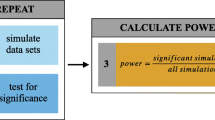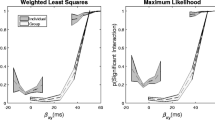Abstract
The method of strong inference, wherein multiple hypotheses are constructed and a crucial experiment is carried out, is said to have special status in science because it guarantees falsifying results. However, the proposition that strong inference is in any way superior to the method of constructing and testing a single hypothesis is contradicted both by close rational analysis and by the empirical evidence. An experiment is reviewed in which subjects who conduct strong tests are much less likely to discover or approximate the truth than subjects who conduct simple tests of a false hypothesis. It is concluded that a potential to falsify is necessary for a test to have corroborative value; however, arguments as to the general superiority of one type of potentially falsifying test over another have no logical basis. Any claim as to a general superiority of strong tests over simple tests would require access to information about the probability of each strategy to produce various relationships between the truth and whatever explanations are most accessible, and such information is not knowable, even in principle.
Similar content being viewed by others
References
Bacon, F.: [1620]/1939, Novum Organum, in E. A. Burtt (ed.), The English Philosophers from Bacon to Mill, Random House, New York, pp. 24–128.
Bassok, M. and Y. Trope: 1984, ‘People's Strategies for Testing Hypotheses about Another's Personality: Confirmatory or Diagnostic?’, Social Cognition 2, 199–216.
Chamberlin, T. C.: 1897, ‘The Method of Multiple Working Hypotheses, Journal of Geology 5, 837–48.
Farris, H. and R. Revlin: 1989, ‘Sensible Reasoning in Two Tasks: Rule Discovery and Hypothesis Evaluation’, Memory and Cognition 17, 221–32.
Gettys, C. F. and S. D. Fisher: 1979, ‘Hypothesis Plausibility and Hypothesis Generation’, Organizational Behavior and Human Performance 24, 93–110.
Gorman, M. E., M. E. Gorman, R. M. Latta and G. Cunningham: 1984, ‘How Disconfirmatory, Confirmatory and Combined Strategies Affect Group Problem Solving’, British Journal of Psychology 75, 65–79.
Gorman, M. E., A. Stafford and M. E. Gorman: 1987, ‘Disconfirmation and Dual Hypotheses on a More Difficult Version of Wason's 2-4-6 Task’, Quarterly Journal of Experimental Psychology 39A, 1–28.
Hempel, C. G.: 1945, ‘Studies in the Logic of Confirmation’, Mind 54, 1–26, 97–121.
Hume, D.: [1748]/1939. ‘An Enquiry Concerning Human Understanding’, in E. A. Burtt (ed.), The English Philosophers from Bacon to Mill, Random House, New York, pp. 585–689.
Klayman, J. and Y. Ha: 1987, ‘Confirmation, Disconfirmation, and Information in Hypothesis Testing’, Psychological Review 94, 211–28.
Kruglanski, A. W.: 1980, ‘Lay Epistemo-Logic-Process and Contents: Another Look at Attribution Theory’, Psychological Review 87, 70–87.
Kruglanski, A. W.: 1989, Lay Epistemics and Human Knowledge: Cognitive and Motivational Biases, Plenum Press, New York.
Kuhn, T. S.: 1962, The Structure of Scientific Revolutions, University of Chicago Press, Chicago.
McDonald, J.: 1990, ‘Some Situational Determinants of Hypothesis-Testing Strategies’, Journal of Experimental Social Psychology 26, 255–74.
McDonald, J.: 1990b, ‘When Considering Alternatives ot a False Hypothesis is Detrimental to Discovering the Truth’, unpublished manuscript.
Mehle, T.: 1982, ‘Hypothesis Generation in an Automobile Malfunction Inference Task’, Acta Psychologica 52, 87–106.
Moore, K. D.: 1986, Inductive Arguments: A Field Guide, Kendall/Hunt Publishing Company, Dubuque.
Mynatt, C. R., M. E. Doherty and R. D. Tweney: 1977, ‘Confirmation Bias in a Simulated Research Environment: An Experimental Study of Scientific Inference’, Quarterly Journal of Experimental Psychology 29, 85–95.
Mynatt, C. R., M. E. Doherty and R. D. Tweney: 1978, ‘Consequences of Confirmation in a Simulated Research Environment’, Quarterly Journal of Experimental Psychology 30, 395–406.
Platt, J. R.: 1964, ‘Strong Inference’, Science 146, 347–53.
Popper, K. R.: 1959, The Logic of Scientific Discovery, Hutchinson, London.
Popper, K. R.: 1983, Postscript to the Logic of Scientific Discovery, Vol. 1, Realism and the Aim of Science, Rowman and Littlefield, Totowa, New Jersey.
Rutherford, E.: 1938, ‘The Development of the Theory of Atomic Structure’, in J. Needham and W. Pagel (eds.), Background of Modern Science, MacMillan, New York, pp. 47–74.
Shaklee, H. and B. Fischhoff: 1982, ‘Strategies of Information Search in Causal Analysis’, Memory and Cognition 10, 520–30.
Skov, R. B. and S. J. Sherman: 1986, ‘Information-Gathering Processes: Diagnosticity, Hypothesis-Confirmatory Strategies, and Perceived Hypothesis Confirmation’, Journal of Experimental Social Psychology 22, 93–121.
Trope, Y. and D. M. Mackie: 1987, ‘Sensitivity to Alternatives in Social Hypothesis-Testing’, Journal of Experimental Social Psychology 23, 445–59.
Tukey, D. D.: 1986, ‘A Philosophical and Empirical Analysis of Subjects' Modes of Inquiry in Wason's 2-4-6 Task’, Quarterly Journal of Experimental Psychology 38A, 5–33.
Tweney, R. D., M. E. Doherty, W. J. Worner, D. B. Pliske, C. R. Mynatt, K. A. Gross and D. L. Arkkelin: 1980, ‘Strategies of Rule Discovery in an Inference Task’, Quarterly Journal of Experimental Psychology 32, 109–23.
Wason, P. C.: 1960, ‘On the Failure to Eliminate Hypotheses in a Conceptual Task’, Quarterly Journal of Experimental Psychology 12, 129–40.
Author information
Authors and Affiliations
Rights and permissions
About this article
Cite this article
McDonald, J. Is strong inference really superior to simple inference?. Synthese 92, 261–282 (1992). https://doi.org/10.1007/BF00414301
Issue Date:
DOI: https://doi.org/10.1007/BF00414301




